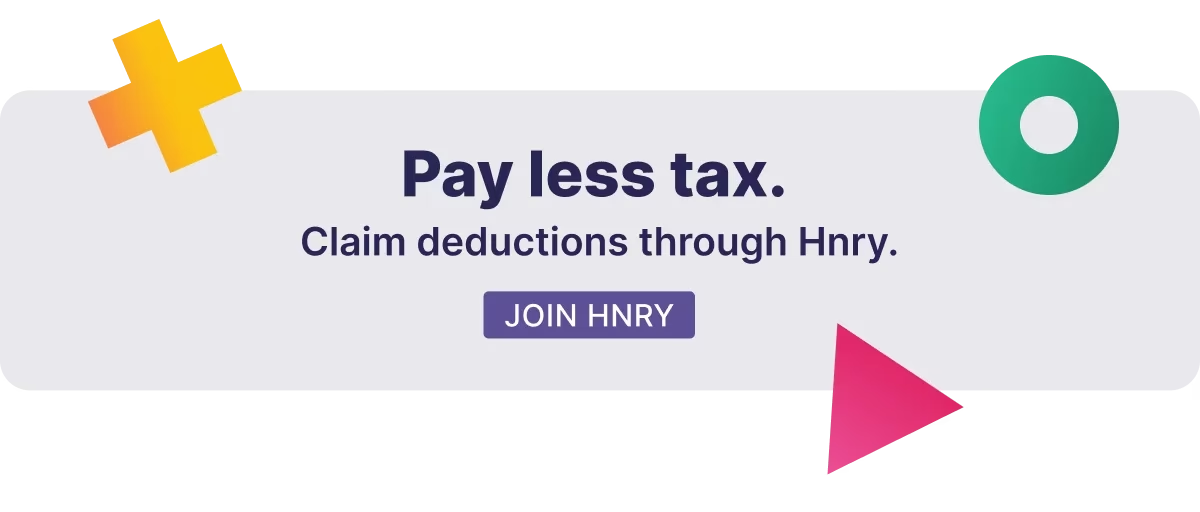After taking office in late 2023, the National-led government made a few changes to Aotearoa’s tax system.
But because the government consists of a three-way coalition, no single party got to implement all their tax promises from before the election. Instead, the new government’s current tax policies consist mainly of National ideas, tweaked in accordance with a few different Act and NZ First priorities. The tax policies are wide-ranging, and have affected most if not all Kiwi earners – including sole traders.
Don’t worry – we’re not here to get into the politics of it all. What we do here at Hnry is help sole traders stay on top of all things tax. That’s why we dug into the legislative changes, so you don’t have to.
Here’s what you need to know:
- Why all the talk about income tax?
- Changes relevant for:
- Hnry stays on top of it for you
Income tax changes 2024
Heading into the 2023 general election, New Zealanders heard a lot about tax.
Given that the main issues at hand were rampant inflation and a cost of living crisis, how we tax income got a lot of air time. This is in part because our tax rates aren’t automatically indexed to inflation (unlike 17 other countries in the OECD who do). As our currency deflates in value, we essentially pay more in taxes and have less left over.
For example, according to Stats NZ, the median annual salary in 2014 was $44,876. This was taxed at an effective tax rate of 15.32%, so $6,873 in income tax.
The equivalent salary in 2024 would be $66,679, due to inflation. But because our tax rate thresholds don’t change with inflation, this salary would be taxed at an effective tax rate of 19.53%, resulting in a tax bill of $13,024 .
📖 Confused about effective tax rates? Check out our explainer on tax rates for sole traders.
Tl;dr – because of inflation, we now pay more for goods and more in taxes. With that in mind, let’s jump into the government’s new tax changes.
Changes relevant for all sole traders
Increasing income tax thresholds
Tl;dr: Sole traders (and all other Aotearoa-based earners) now pay less income tax.
This one’s the biggie!
While the actual tax rates haven’t touched, the government increased tax rate thresholds effective 31 July 2024.
| Previous threshold | New threshold | Tax rate |
|---|---|---|
| <$14,000 | <$15,600 | 10.5% |
| $14,001 - $48,000 | $15,601 - $53,500 | 17.5% |
| $48,001 - $70,000 | $53,501 - $78,000 | 30% |
| $70,001 - $180,000 | $78,101 - $180,000 | 33% |
| $180,001 and over | $180,001 and over | 39% |
Basically, because you now have to earn more to qualify for a higher tax rate, your effective tax rate (the actual percentage of tax you pay across your whole income) has gone down. These changes went live on the 31st of July, 2024. They don’t fully account for all inflation since the original thresholds were set, but it’s a start.
💡 FY 2024/25 is a bit different, in that tax thresholds are changing partway through the year. To make things easier, the IRD has prepared a set of transitional rates to use. For more context, check out our guide to the threshold changes.
💡 The National-NZ First Coalition Agreement states the government must “assess the impact inflation has had on the average tax rates faced by income earners,” by 2026. There may be more changes made in the future!
Increasing eligibility for the IETC
Tl;dr: More sole traders (and all Aotearoa-based earners) will be eligible for the Independent Earner Tax Credit (IETC).
The Independent Earner Tax Credit was introduced by a previous National government as a way to target tax relief towards people who don’t qualify for other help, like benefit payments or Working for Families credit.
💡 Note: “Independent Earner” here isn’t a synonym for sole trader, although it sounds like one! Instead, it refers to everyone earning an income.
Because of inflation, it’s harder to qualify for this credit (up to $10 a week) than was originally intended.
From 31st July 2024, the government increased the upper threshold of eligibility from $48,000 to $70,000, with abatement of payment starting at $66k.
The lower eligibility limit will remain at $24,000.
In short: if you earn between $24k and $70k a year, you’ll receive a credit of up to $10 a week towards your final tax bill. If eligible for the full amount, you’ll get a discount of $520 on your tax bill each year.

Changes relevant for sole traders with children
The FamilyBoost child care tax credit
Tl;dr: From 1st July 2024, the 20 hours free Early Childhood Education (ECE) is no longer extended to apply to children aged two and under. Instead, National will offer a 25% rebate of up to $150 a fortnight.
This new childcare tax credit is set to replace the previous government’s 20 hours free Early Childhood Education policy plan for under twos (children 3+ will remain eligible).
The government will pay a rebate of up to 25% of a family’s childcare costs, worth up to $150 a fortnight.
This applies for all families earning under the maximum threshold of $180,000 annually. However, payments will abate from $140,000 onwards, to make sure it goes to those who need it most.
Basically, if you have children aged 2 or below, who attend early childhood education, the 20 hours free you were going to be entitled to under the previous government will be swapped for a fortnightly rebate of up to $150.
Whether or not you end up saving more may depend on your specific situation – you’ll have to crunch the numbers!
Increasing Working for Families tax credits
Tl;dr: Support received through Working for Families tax credits are set to increase.
Working for Families tax credits are a series of tax credits aimed at families with dependent children under the age of 18.
The new government pledged to keep the automatic increases to Working for Families payments that currently exist in law. So far, they’ve increased:
- The Family Tax Credit rates from $136 to $144 per week after tax for the eldest child, and from $111 to $117 per week for a subsequent child.
- The Best Start tax credit rate from $69 to $73 weekly after tax.
(There was a plan to increase the abatement threshold [the income threshold at which payment amounts start decreasing] for Working for Families payments to $50,000, but this has now been scrapped.)
(There was also a plan to increase the value of the in-work tax credit by $25 a week, from 1 April 2024, but this hasn’t yet been confirmed.)
You can read more about the Working for Families tax credits on the IRD website.
Changes for sole traders with rental properties
Mortgage interest deductibility reintroduced for rental properties
While National initially included this policy as part of their plan, ACT has negotiated to accelerate it.
Mortgage interest deductibility for rental properties will be phased back in, with:
- 80% deductibility from 1st April 2024
- 100% deductibility from 1st April 2025
💡 Remember: mortgage interest deductibility for rental properties means you can claim a deduction for the interest accrued on your rental property mortgage – not the entire mortgage payment!
💪 If you’re a Hnry user, we’ll automatically claim interest deductibility on your rental properties as soon as these changes go live. Join Hnry today!
Changes for sole traders with business vehicles
Removing the Auckland Regional Fuel Tax
Tl;dr: Auckland-based sole traders now pay $0.10+GST a litre less for fuel.
This one does exactly what it says on the tin: as of 30th June 2024, the Auckland Regional Fuel Tax has been axed.
The pump price of fuel has decreased.
Removing the “Ute Tax” and Clean Car Discount
Tl;dr: Higher CO2-emitting vehicles are no longer subject to fees.
National repealed the “Ute Tax” as it’s colloquially known for all vehicles registered after 31st December 2023. The government also repealed the Clean Car Discount at the exact same time.
The “Ute Tax” was never actually a tax. Instead, it was part of the Clean Car Standard that added fees to the cost of vehicles with high CO2 emissions, in order to fund a discount for the purchase of “cleaner” electric and hybrid vehicles.
From 1st January 2024, it no longer costs extra to register a higher CO2-emitting vehicle, or less to register an electric vehicle.
Changes for sole traders in the sharing economy
GST collection changes
Tl;dr: From April 1st 2024, GST collection has changed for sole traders participating in certain digital marketplaces (eg. AirBnb hosts, Uber drivers) :
- Workers not registered for GST will receive an 8.5% untaxed rebate;
- Workers registered for GST no longer need to collect GST and pay it to the IRD.
Workers not registered for GST
Workers below the $60k threshold still don’t have to register for GST. However, the online marketplace they sell through will be required to charge and collect GST from the end customers. 8.5% of this GST collected will be passed on to the worker as a flat-rate credit (meaning it’s untaxed), and the remaining 6.5% will be passed on to the IRD.
Workers registered for GST
If you’re above the GST threshold, you’ll still need to register for GST. You’ll also need to list your services sold through online marketplaces as zero-rated supply in your GST return.
Instead of collecting GST directly, the platform you work through will charge and collect GST for you instead, sending this to the IRD on your behalf.
You’ll still be able to claim GST on business expenses in your GST returns as per usual. But if you receive the flat-rate credit of 8.5%, you’ll need to make a debit adjustment in your GST return accordingly. Otherwise, the IRD may apply penalties.
💡 This section has been updated to reflect the most recent rule changes. Originally, National had planned to reverse the “app tax”, but then reversed that reversal.
Policies that were scrapped
While a significant majority of National’s tax plans made it through the coalition negotiations, there was one significant proposal that didn’t.
Foreign buyers tax
Tl;dr: The scrapping of the foreign buyers tax could result in further tax changes, to help cover the potential budget shortfall.
The previous government banned foreign buyers from entering the New Zealand housing market in 2018. The intention was to help take some heat out of the housing market.
National proposed allowing foreign buyers back into the market, but only for properties worth $2million or more – and they would have to pay a foreign buyer’s tax of 15%.
New Zealand First, however, have put the kibosh on this plan.
While this policy isn’t entirely relevant for New Zealand sole traders, what it does mean is that National can no longer rely on this tax revenue to fund some of their other priorities, like the proposed tax cuts.

Hnry takes care of it all for you
Sole traders have enough to worry about already, without staying glued to the news to see how their businesses will be affected by political change.
That’s why Hnry exists. We’re an award-winning tax service designed specifically for sole traders. We stay on top of all things tax, so you don’t even have to think about it.
For just 1% + GST of your self-employed income, capped at $1500 a year, Hnry will calculate and pay all your taxes, levies and whatnot for you, including:
We also file your tax return every year, all as part of the service. Oh, and we chase-up late paying clients on your behalf. And we manage and claim every expense you raise, so you get all the tax savings you’re entitled to in real time.
Basically, we make it so that you never have to think about tax again.
Join Hnry today!
Share on:

